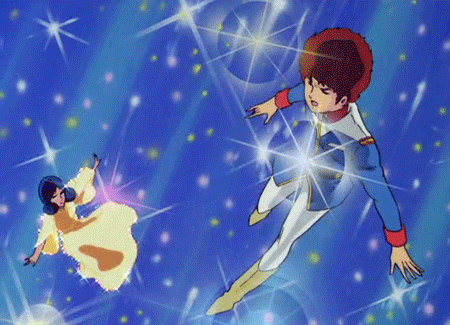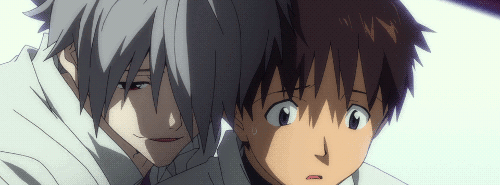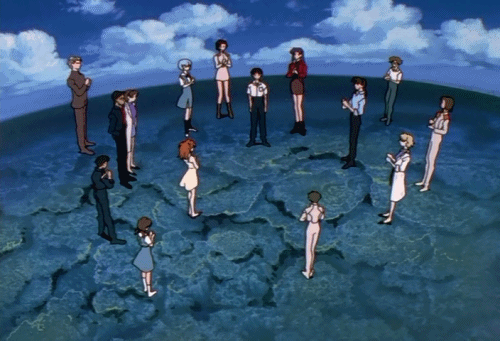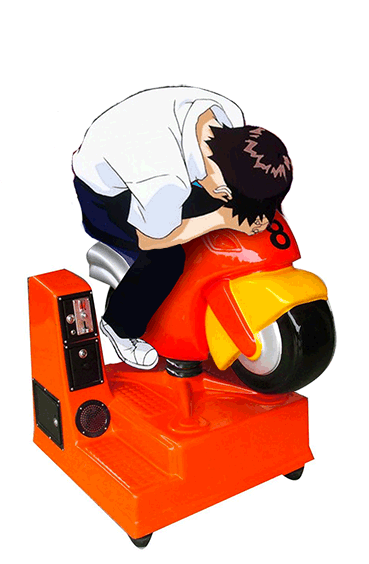The Evolution of Evangelion: Rebuild vs. TV
by Gabriella Ekens,Since the film series was announced in 2006, much ado has been made about the “Rebuild of Evangelion.” The project has alternately been described as a remake of or sequel to one of the most influential anime of all time, so the reaction to these movies has been polarizing. Where one camp might champion Rebuild as a refinement of the flawed original narrative, another might decry its deviations from the beloved source. What is it about Neon Genesis Evangelion that provokes such fervor, and what truly sets these two versions apart?
Rather than seeing the Rebuild films as replacements for the original series, it's more revealing to look at them as subsequent works where their creator, Hideaki Anno, reflects upon the original. He's looking back at the feelings of depression he first channeled into Evangelion with a renewed perspective, which is a big deal because those feelings were a major part of why so many people love the original show – you'd be hard-pressed to find a more honest depiction of crippling depression in pop culture. But Rebuild isn't Hideaki Anno "changing his mind" about how he felt, only changing his point of view in relation to those feelings.

If the original series comes from the “inside” perspective of someone in the midst of depression, Rebuild comes from the “outside” perspective of someone who has recovered from that state. This one simple difference changes everything how the two versions of Evangelion treat their characters – Rebuild allows them to make their own mistakes, while the original series frames the world around them as completely harsh and unforgiving. Taken together, these two versions of Evangelion reveal a powerful real-life story about a man coming to terms with his emotional past.
By his own admission, Anno illustrated Evangelion in blood straight from his own exposed heart. He channeled his personal problems into a pastiche of the mecha coming-of-age stories that dominated his otaku childhood. One of my favorite things about watching the original Mobile Suit Gundam (one of his favorite anime) was seeing how a young Anno might have latched onto aspects of that work and incorporated them into Evangelion. For example, there are the scattered suggestions of main character Amuro's daddy issues, along with that time when his magical space girlfriend turned into a pile of yellow goo.


Evangelion plays out like a version of Anno's favorite science-fiction anime that's been shuffled around and rewritten to speak to him personally. In the same way that Gundam's zaku, gelgoog, and minovsky particles are nonsense terms used to give the impression of a larger story-world, Evangelion's much-examined Judeo-Christian symbolism is just a tool used to explore a deeper emotional narrative about depression.

So if both the Evangelion TV series and the Rebuild films are about exploring feelings of depression, what makes one feel more like an "inside" view while the other shifts "outside?" Let's start by looking at the original TV series, which hit like Third Impact in 1996. It set off a unique wave of otaku fanaticism, critical acclaim, and mainstream awareness that has never been replicated even today. It hit a raw nerve and got stuck there, indelibly marking an entire generation of anime fans and influencing other creators for generations to come.
Evangelion succeeded in its rare two-pronged attack of casual enjoyment and thematic depth by gradually turning one into the other. It had all the successful hallmarks of a mainstream mecha series, like cute girls, cool robots, and a memorable world sculpted by talented artists. But unbeknownst to its initial audience, it was building to something very different from the easily marketable hero's journey. The man at the helm of this project was about to pour the blackest pit of his heart onto the moving canvas.

Neon Genesis Evangelion is beloved because it encapsulates what it feels like to be depressed. Not just "kind of sad in between moments of serving as a functional human being" depressed, but totally paralyzed, isolated, convinced down to the core of your soul that you are a worthless waste of skin who burdens everyone around you D-E-P-R-E-S-S-E-D. Now, that's not to say that everyone who's deeply invested in Evangelion relates to this aspect of it. But many people do have a little bit of Shinji inside them, particularly if they're anime-watching nerdlingers like you and me. Even before viewers actively realize that the story is about depression, the entire design of Evangelion's world is working toward creating an overwhelming atmosphere of isolation, entrapment, and despair.
First, there's the imagery. Depression isn't sadness, but rather dullness, a lack of feeling. EVA's characters are all people who feel hollowness, alienation, and self-loathing rather than active sadness. Consequently, many of Evangelion's most enduring images are of starkness, bleakness, and deprivation, which means that scenes tend to be dominated by one color.

Clinical blue for the hospital scenes.

Amniotic yellow for the dream sequences.

And red for the really painful, apocalyptic stuff.
Characters are also very rarely allowed to rest comfortably in the frame with one another.

When Shinji, Rei, Asuka, Misato, Ritsuko, or Gendo speak to one another, they rarely occupy the same shot together. During extended conversations, Evangelion often turns into fast-changing close-ups of individual characters' faces. The cinematography also tends to exaggerate differences in the characters' heights, indicating that they're “not on the same level” with each other.

In the instances when they do share the screen, characters rarely face one another, becoming separated by some gulf of physical space, no matter how small. As the series go on, these techniques only intensify, because everyone's relationships are breaking down.

As they begin to actively push back against each other, characters become symbolically caged by their environment. This framing is so constant and so powerful that it's alarming to see it diminished in Rebuild of Evangelion, but comparing scenes from both side by side illustrates an immediate change in perspective.

The Rebuild films make use of a warmer and brighter color palette. While there are still moments of expressive lighting taken from the original series, and the scene's narrative goals might often be the same, colors and environments always lean more naturalistic. The films also contain many moments of genuine contact and intimacy. In the comparison above, Rei is no longer staring at nothing, and there is far more eye and body contact in general throughout Rebuild. For example, Shinji's relationship with Kaworu is implied to be a real connection, not just an Angel's trick like in the television series. The moments they share are downright romantic.

On a visual level alone, Rebuild is already way more open to the possibility of connection, growth, and intimacy. But that's just the tip of the iceberg.
While the visuals suggest a change of heart in Evangelion's creator, the story itself has changed in Rebuild down to its very core. It's fair to say that the Evangelion TV series is profoundly flawed in terms of narrative structure. It builds up a cast of complex characters, but denies them the opportunity to actually confront their flaws to the very end. Budgetary failings aside, the final two episodes are a narrative cop-out that leave everyone's story unresolved, except for Shinji's. Shinji's own resolution is forced to happen completely outside the constraints of the story's world, which is left frozen in uncertainty. Many of the formal criticisms levied at Evangelion's story are completely fair – I just don't think they matter very much to why this show is important to people. Sure, the Evangelion TV series does a poor job at justifying its pessimistic worldview, but as purely expressive art, it nails the oppressive hopelessness of living with depression. Anno's goal was not to convince viewers that our world is as bad as it was in Evangelion, but just to show that it feels this bad to some people.

Its obsession with exploring depressive feelings from the inside-out make Evangelion TV deeply flawed as a dramatic narrative. There's no trigger to the successful therapy session that Shinji receives over the last two episodes. The script itself just starts interrogating him. It's deus ex machina without even the pretense of a plausible narrative event. Anno knew that a realization like this – that you need to make conscious efforts to improve yourself and connect with others – is how you start climbing out of the depressive pit. However, he was still too close to his own depression, so he lacked the emotional clarity to create a connective moment between hopelessness and recovery in the story itself. By contrast, The End of Evangelion film did flesh out a natural conclusion to the story's events by throwing catharsis out the window completely, depicting everyone including Shinji's self-destruction in all its messed-up glory.
Rebuild of Evangelion hasn't gotten to its equivalent of those last two episodes yet, but I'm excited to see whether Anno, with twenty years of added distance, has finally found the words to describe the moment that begins recovery. So far, his work on Rebuild suggests that Anno's newfound capacity to view depression from the outside-in has made him better at telling stories on a practical level, while not losing his grasp on what made his voice as an artist so emotionally effective.

Now three movies in, Rebuild's story may become just as grim as the original series, but its reflective take allows the characters catharsis, connection, and choice. At the end of the first film, Shinji and Rei began to connect. They grow closer during the second film, to Asuka's jealousy. Although she publicly rejects others, she has a desperate need to be wanted, becoming possessive of her roommate Shinji. Despite this potential rift, both Asuka and Rei experience stunning moments of growth. Rei begins to actively reach out to Shinji, while Asuka puts an end to their one-sided feud by performing a genuine act of kindness. Of course, they're rewarded with an event that takes them back to square one and causes the literal apocalypse at the end of the second film, but this is more than they ever get in the original series, where connection seemed not only futile but impossible. These pilots aren't mortally wounded in relation to one another, and they can begin to heal through their own choices. If Anno can see ways for his characters to strive for solutions, that must also mean that he's seen the root causes of their problems in ways he hadn't before.
In the series, the world is unduly cruel and unfair to a completely passive Shinji. This reflects how depressed people consider themselves to have no agency and view their suffering as inexplicable. By contrast, Rebuild Shinji has an active role in shaping those peaks and valleys, because the story constantly recognizes the consequences of his own choices. Yes, Gendo is always manipulating him, but Shinji also sabotages himself by continuing to trust that monster on some level, no matter how much smaller it might seem to get. Before he can ever be truly happy, Shinji needs to accept that his daddy will never love him.
So while the narrative trajectory in the original series becomes an emotional free-fall into the Pit of Inarticulate Despair (interrupted at the last second by the Ladder of Successful Therapy), the Rebuild films are a gradual series of fragile recoveries being continually smacked down by the Real Source of the Problem – in Shinji's case, a terrible, terrible father.

Ultimately, the Neon Genesis Evangelion TV series is about emotionally messed up people getting worse until they crash. Rebuild of Evangelion is about those same people in a world with more clarity, where the source of their problems and the healing process are both visible. Since 1995, Anno appears to have made strides in his personal life, getting married and building a merchandising empire. However, he admits to still falling into depressive spells, like in the aftermath of making Evangelion: 3.33: You Can (Not) Redo. (SOURCE) Depressed people tend to take comfort in the same repetitive activities (just look at Shinji playing the same two songs on his Walkman over and over), and Anno may take comfort in repeating the stories of Shinji, Asuka, and Rei. But the upcoming fourth film marks an important opportunity for divergence. The final Rebuild movie could provide a definitive end to the saga by allowing Shinji, after more than two decades, to take his first real step forward in his own world. For many people (myself included), Evangelion is like an emotional time capsule for their 15-year-old self – I can't imagine what it's like to be the guy who made that, finding himself faced with deciding Shinji's fate once again as a very different adult.
Of course, the daunting significance of that achievement opens up a darker possibility. Maybe instead of allowing Shinji to get on with his life, Anno will try to top End of Evangelion with a more brutal illustration of profound self-loathing. Personally, I doubt that. The final scenes of End of Evangelion and Evangelion 3.0 are counterpoints to one another, both taking place in a post-apocalyptic red wasteland where only three pilots remain. In End of Evangelion, this is a sort of reverse Adam and Eve, where the last man and woman on a ruined world reject one another due to their unconquerable issues, while a deadened Rei watches on. Evangelion 3.0, however, ends on another moment of attempted connection, with Asuka dragging a distraught Shinji through the wasteland. Shinji's past kindness also seems to have awakened something in the latest Rei clone as she follows them. Given this evidence, Evangelion: 3.0+1.0 might become an optimistic revision of End of Evangelion's black pit of hopelessness. Anno may have finally realized how to articulate a plausible recovery for Shinji, rather than providing it via deus ex machina (as in the television show) or just letting him succumb (as in End of Evangelion).

To me, Evangelion comes most alive when comparing Rebuild and the original series to one another. The films have been able to comment powerfully on the original without making it feel irrelevant. Rebuild Kaworu acts like he's seen all these events happen before, which could tie into the theme of characters repeating the same mistakes until they can find a way out. Wherever the story takes them, I hope that it's new ground for both creator and creation.

What do you like most about Neon Genesis Evangelion? Do you prefer the original series or the Rebuild movies? Share your feelings with us in the comments!
discuss this in the forum (62 posts) |